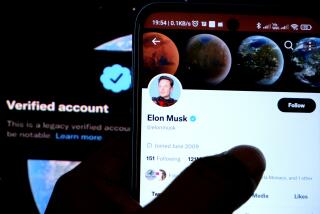Facebook email switch continues causing problems
- Share via
After causing a raucous week by changing users’ listed email addresses to ones ending in @facebook.com, Facebook’s switch is causing yet another embarrassment for the company and problem for many users.
The email switch has gone beyond the walls of Facebook, according to various users, who are saying that the change is affecting the emails listed in their contact books.
Across the Web, people are saying the emails listed for many of their contacts in their address books have been replaced by @facebook.com emails.
ROUNDUP: The freshest Facebook features
“Today, a co-worker discovered that his contact info for me had been silently updated to overwrite my work email address with my Facebook email address. He discovered this only after sending work emails to the wrong address,” said another user, adding later: “For all I know, I could be missing a lot more emails from friends, colleagues, or family members, and never even know it.”
And the reason the change seems to be affecting users’ address books appears to be a result of any syncing or integrating they have done with the social network.
“I sync my phone with Facebook for many of my contacts,” said one user who called the change “annoying.” “Now I have an address book full of bogus email addresses where they were correct before.”
If you sync your contacts with Facebook, do as CNET advises and give your address book a checkup to see if you’ve been affected.
And if the email listed for you on Facebook is important, make sure you change the way it’s listed as soon as possible. You can do that if you go to your profile, click “Update info,” scroll down to “Contact Info” and click “Edit.” Select with whom you want to share each individual email address and to the right of that choose whether you want your email displayed on your timeline or not by using little gray circles.
But the problem doesn’t end there. Many users are also saying that the @facebook.com address is resulting in them not receiving emails being sent by others.
When someone emails you at your @facebook.com address you are supposed to receive it the same way you do any other Facebook message, which is in your Facebook inbox. But as Facebook explained to CNET, the problem is likely that users don’t understand that some of those emails end up in a subsection of the inbox labeled as “Other.”
“By default, messages from friends or friends of friends go into your inbox,” a Facebook spokesperson told CNET. “Everything else goes to your Other folder. (If you click on Messages in your left hand navigation menu, you’ll see below it an Other folder that drops down.) That is likely where the messages are being sent from other people’s emails. Even if that person is friends with them on Facebook, if the friend doesn’t have that email on their Facebook account, the message could end up in the Other folder.”
The problem here is that users are confused because this “Other” box has never been explained in a prominent manner by the social network company since it was introduced.
As Facebook explained, emails to your @facebook.com address will only show up in your regular inbox if they are sent from an email address listed on Facebook by your friends or by friends of friends. If another email address, even an unlisted email belonging to a friend of yours, sends you a message, that message will be directed to the “Other” box.
Hopefully, that clears the air for people on how @facebook.com emails work, but the problem still remains that for the most part the “Other” box is used by Facebook as though it were a spam box. Most of the messages I have in that box would have been classified by Gmail as spam. Categorizing all unfamiliar emails in the same box as spam while switching users’ listed emails on both Facebook and other synced platforms is a minefield of problems for the company.
RELATED:
Could Facebook be testing a ‘Want’ button?
Facebook admits email switch could have been handled better
Facebook changes everyone’s listed emails to ‘@facebook.com’
Follow Salvador Rodriguez on Facebook, Twitter or Google+
More to Read
Inside the business of entertainment
The Wide Shot brings you news, analysis and insights on everything from streaming wars to production — and what it all means for the future.
You may occasionally receive promotional content from the Los Angeles Times.











